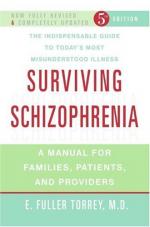|
This section contains 402 words (approx. 2 pages at 300 words per page) |
Schizophrenia
If you have at least two of the following symptoms, for at least one month then you are suffering from Schizophrenia:
- Hallucinations
- Delusions
- Negative symptoms (see below)
- Disorganized speech
- Grossly disorganized or catatonic
Positive symptoms- Hallucinations, delusions, agitation, disorganized thinking.
Cognitive symptoms- Poor memory, attention deficit, executive dysfunction.
Affective symptoms- Depression, elation, suicidal ideation.
Different Types of Schizophrenia:
Disorganized schizophrenia- a person is often incoherent but may not have delusions.
Residual schizophrenia- a person is no longer delusion or hallucinating, but has no motivation or interest in life. These symptoms can be most devastating.
Catatonic schizophrenia- a person is withdrawn, mute, negative and often assumes very unusual postures.
Paranoid schizophrenia- a person feels extremely suspicious, persecuted, grandiose, or experiences a combination of these emotions.
Causes
It is essentially unknown what causes schizophrenia. Significant changes in the usage of the brains frontal and parietal lobes have been associated with schizophrenia.
Some people believe that if there is a virus in the pregnant woman, it may damage the fetus' brain. Making the child's future more exposed to mental illness.
A lot of people feel it's purely genetic, and others think something in the environment helps it to develop.
Risk Factors
Risk factors for schizophrenia include the following:
- Genetics
- Abnormalities in brain structure
- Abnormal brain chemistry
- Birth trauma
- Exposure to a virus
- Environmental conditions
Twins and adoption studies suggest that genetics play a major role in the transmission of schizophrenia.
There is a lot of evidence to suggest that schizophrenia is genetically transmitted although, genetics do not explain who will get the disorder.
Schizophrenia is not contagious in any way, shape, or form.
Most affected
More than 2.5 million Americans are affected by schizophrenia, an estimated one in every 100 people.
Schizophrenia is usually found between the ages of 15 to 25 years
Cures
There are no cures for schizophrenia, but there are many different treatments that you can take. All the treatments are taken from your specific needs. Poor medication is among the leading causes for becoming sick again and rehospitalization for people with schizophrenia
There are very dangerous consequences to stopping medications or altering the dose without the Doctors involvement. 80% of patience go back to being ill in 1 year off medication, 90% in 2 years .20% go back if they stay on medications
|
This section contains 402 words (approx. 2 pages at 300 words per page) |


